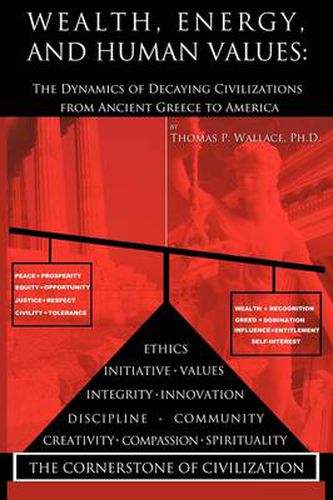Readings Newsletter
Become a Readings Member to make your shopping experience even easier.
Sign in or sign up for free!
You’re not far away from qualifying for FREE standard shipping within Australia
You’ve qualified for FREE standard shipping within Australia
The cart is loading…






This title is printed to order. This book may have been self-published. If so, we cannot guarantee the quality of the content. In the main most books will have gone through the editing process however some may not. We therefore suggest that you be aware of this before ordering this book. If in doubt check either the author or publisher’s details as we are unable to accept any returns unless they are faulty. Please contact us if you have any questions.
The degradation of the modern American culture, including its 2008 financial and economic crisis, and the modern rejuvenation of Asian cultures are best understood within the context of 4,000 years of human history. Such are the consequences of the dynamics of cultural change, responding to societal variables of wealth, energy, and human values. This work provides a unique and formidable science-based framework for civilization development that complements and enhances the work of preeminent historians and sociologists. Accordingly, the foundation for societal progress is placed on restrictive scientific definitions, principles, and concepts of energy and wealth consumption, rather than solely on behavioral perspectives derived from empirical data and historical events. Society’s dynamic forces are linked to the cultural deterioration and collapse of Ancient Greece and Rome, Imperial Spain, and Great Britain. Specific chapters are devoted to stagnation of Western civilization, Asian and Islamic resurgence, deterioration of the American culture, and ecological degradation of North America’s largest estuary, the Chesapeake Bay; collateral damage of socio-economic profitability. The characteristics of America’s current cultural deterioration parallel those of previous great civilizations. These include abuse of wealth and energy resources; excessive individual and national debt; lack of cultural civility, discipline, integrity, and ethics; unaffordable militarism, escalating income and wealth disparities; unresolved crises in health care and public education; and stultifying cultural complexity and bureaucracy. Themes include the underlying principles responsible for the eventual deterioration of all known civilizations; the basis for the recurring, sequential periodicity of civilization success and failure; and the roles and significance of militarism and religion in civilization growth, decay, and rebirth; Addressing these themes necessitates the integration of the academic disciplines of history, sociology, economics, and science, reflecting human nature and socioeconomic and political realities that fundamentally and continuously alter human values, priorities, and behavior, thus creating human history.
$9.00 standard shipping within Australia
FREE standard shipping within Australia for orders over $100.00
Express & International shipping calculated at checkout
This title is printed to order. This book may have been self-published. If so, we cannot guarantee the quality of the content. In the main most books will have gone through the editing process however some may not. We therefore suggest that you be aware of this before ordering this book. If in doubt check either the author or publisher’s details as we are unable to accept any returns unless they are faulty. Please contact us if you have any questions.
The degradation of the modern American culture, including its 2008 financial and economic crisis, and the modern rejuvenation of Asian cultures are best understood within the context of 4,000 years of human history. Such are the consequences of the dynamics of cultural change, responding to societal variables of wealth, energy, and human values. This work provides a unique and formidable science-based framework for civilization development that complements and enhances the work of preeminent historians and sociologists. Accordingly, the foundation for societal progress is placed on restrictive scientific definitions, principles, and concepts of energy and wealth consumption, rather than solely on behavioral perspectives derived from empirical data and historical events. Society’s dynamic forces are linked to the cultural deterioration and collapse of Ancient Greece and Rome, Imperial Spain, and Great Britain. Specific chapters are devoted to stagnation of Western civilization, Asian and Islamic resurgence, deterioration of the American culture, and ecological degradation of North America’s largest estuary, the Chesapeake Bay; collateral damage of socio-economic profitability. The characteristics of America’s current cultural deterioration parallel those of previous great civilizations. These include abuse of wealth and energy resources; excessive individual and national debt; lack of cultural civility, discipline, integrity, and ethics; unaffordable militarism, escalating income and wealth disparities; unresolved crises in health care and public education; and stultifying cultural complexity and bureaucracy. Themes include the underlying principles responsible for the eventual deterioration of all known civilizations; the basis for the recurring, sequential periodicity of civilization success and failure; and the roles and significance of militarism and religion in civilization growth, decay, and rebirth; Addressing these themes necessitates the integration of the academic disciplines of history, sociology, economics, and science, reflecting human nature and socioeconomic and political realities that fundamentally and continuously alter human values, priorities, and behavior, thus creating human history.